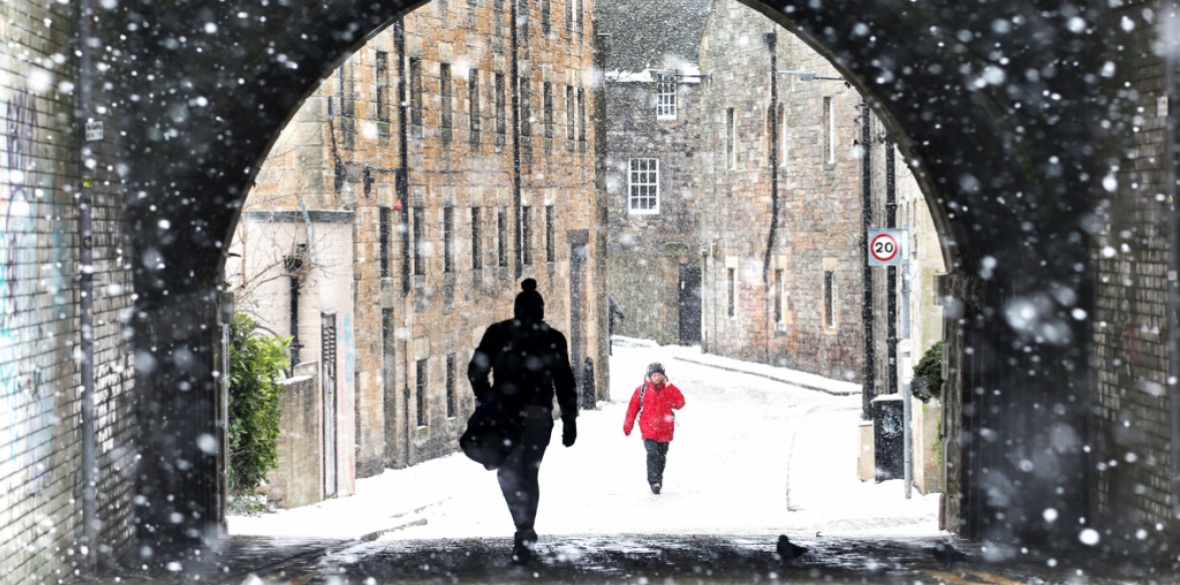This is the last article you can read this month
You can read more article this month
You can read more articles this month
Sorry your limit is up for this month
Reset on:
Please help support the Morning Star by subscribing here
NIGHTTIME temperatures will near freezing levels in Edinburgh on Sunday.
Last-minute Christmas shoppers will hurry home from Princes Street for parental present-wrapping sessions.
The concourse at Waverley will be rammed with families awaiting the arrival home of loved ones.
Others will be carried sideways through the night, as the city’s greatest modern poet Norman MacCaig put it, on the last sleeper trains before Christmas.
Edinburgh’s inherent tweeness becomes an asset in December. The manicured perspectives offered by street upon street lend themselves perfectly to festive cheer, as trees are adorned with tinsel and lights. Who could possibly not feel a sense of escape when faced with this magical spectacle?
The family of William Scott, for a start. At 90 years old, Scott was reported missing from his home in Leith on December 11 — a full 12 days ago.
He was last seen that day in the King’s Wark and Finn and Bear pubs in Leith Shore.
His granddaughter Charlotte Gibson described him as “very caring and thoughtful,” a man who “still goes round to neighbours to see if they need milk or bread or offer to clean their windows.”
But unsurprisingly for a man of his age, Scott is also in a vulnerable state of health. The cold temperatures have led the police to urge residents to check outbuildings in their gardens, in case he has taken shelter there.
I’ll pause here and concede that this sort of story is not often seen in the Morning Star.
With just five news pages each day, we tend to focus on industrial and political stories which we know will get little attention in the rest of the media.
Many of the most laudable articles in other papers can be described with the broad label of “human interest.”
With so much news now dominated by the closed worlds of celebrity, business and Westminster politics, the stories of ordinary people — when they are not being unfairly attacked, as is quite often the case — cannot help but speak truth to power.
But the story of William Scott is not just one of a missing person. It is a story in which even the most social of characters can pass through his own community without interaction. It is a story in which the wellbeing of society’s most vulnerable is regularly denied to be part of public responsibility, but left to one’s own family.
Fortunately for Scott, he has a family — and one which seems to passionately care for his safety. Others are not so lucky.
I hope Scott will be found alive, but I can’t help but think of Joyce Carol Vincent, the woman found dead in north London in January 2006, having lain undiscovered on her sofa for three years.
With huge regional disparities in care provision and cost across both Scotland and the rest of Britain, the demand for a national care service is more pressing than ever.
I sat down to write this article after a chance conversation outside Queen Street station in Glasgow. My interlocutor, like Scott, was also from Leith.
She said the disappearance had brought back memories of a family member who had gone missing in similar circumstances, to be found dead from hypothermia 50 miles away in Glasgow.
The predicament of post-society Britain — of which William Scott’s case may well be an exception, rather than an example — will take more than policy fixes.
Thirty-one years after Margaret Thatcher told Women’s Own magazine that there was no such thing as society, we have still not recuperated our collective identity.
Of course, Christmas should offer us some escapism — but that can’t come at the price of forgetting the world outside. Presents and the Doctor Who special can’t save us on their own: Joyce Carol Vincent’s TV was still on three years later, and a pile of gifts was below her tree.
As we move towards the new year, we could find worse resolutions than one that can only work if it’s collective: it’s time to bring back society.

 Conrad Landin
Conrad Landin










